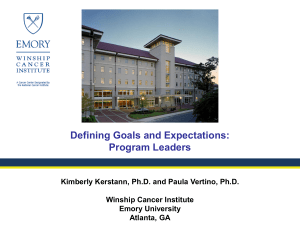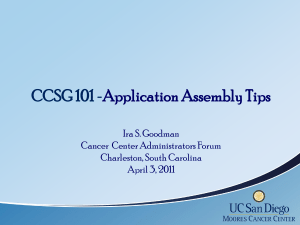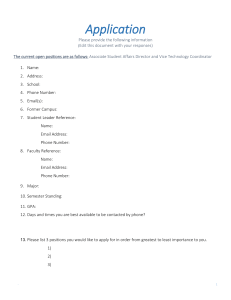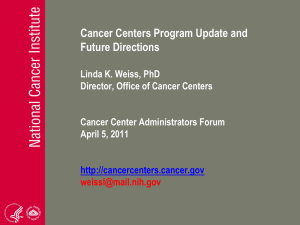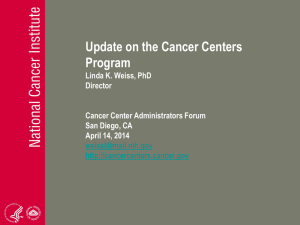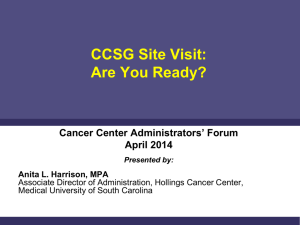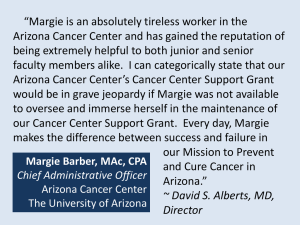Developing the Collaboration`s policy related to potential conflicts of
advertisement
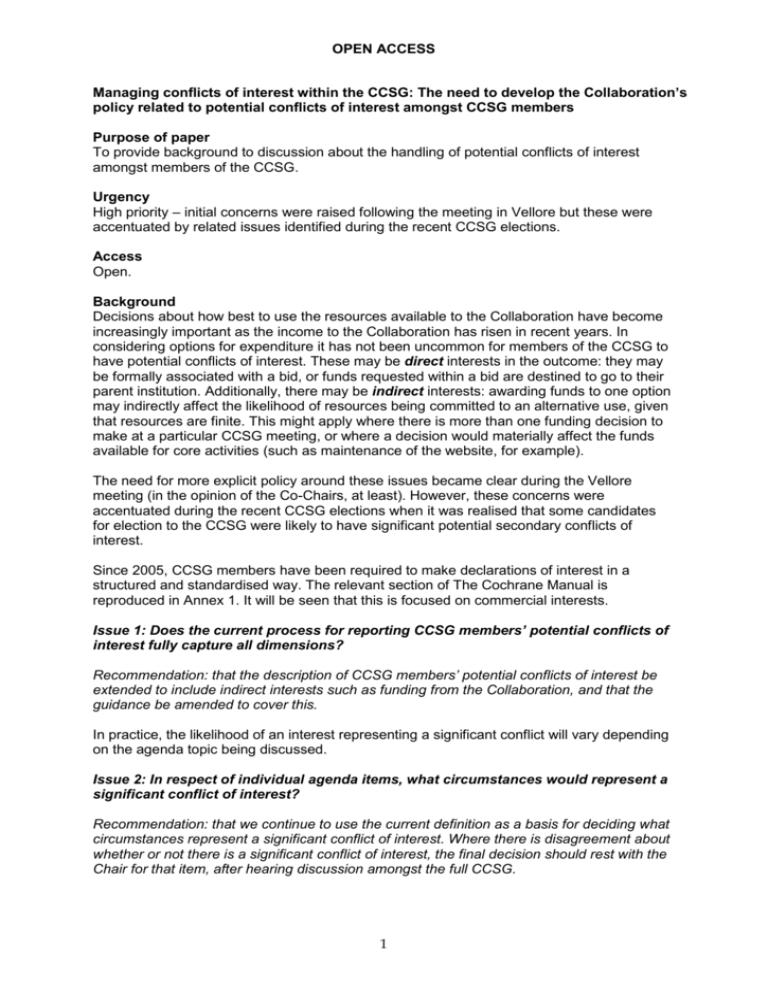
OPEN ACCESS Managing conflicts of interest within the CCSG: The need to develop the Collaboration’s policy related to potential conflicts of interest amongst CCSG members Purpose of paper To provide background to discussion about the handling of potential conflicts of interest amongst members of the CCSG. Urgency High priority – initial concerns were raised following the meeting in Vellore but these were accentuated by related issues identified during the recent CCSG elections. Access Open. Background Decisions about how best to use the resources available to the Collaboration have become increasingly important as the income to the Collaboration has risen in recent years. In considering options for expenditure it has not been uncommon for members of the CCSG to have potential conflicts of interest. These may be direct interests in the outcome: they may be formally associated with a bid, or funds requested within a bid are destined to go to their parent institution. Additionally, there may be indirect interests: awarding funds to one option may indirectly affect the likelihood of resources being committed to an alternative use, given that resources are finite. This might apply where there is more than one funding decision to make at a particular CCSG meeting, or where a decision would materially affect the funds available for core activities (such as maintenance of the website, for example). The need for more explicit policy around these issues became clear during the Vellore meeting (in the opinion of the Co-Chairs, at least). However, these concerns were accentuated during the recent CCSG elections when it was realised that some candidates for election to the CCSG were likely to have significant potential secondary conflicts of interest. Since 2005, CCSG members have been required to make declarations of interest in a structured and standardised way. The relevant section of The Cochrane Manual is reproduced in Annex 1. It will be seen that this is focused on commercial interests. Issue 1: Does the current process for reporting CCSG members’ potential conflicts of interest fully capture all dimensions? Recommendation: that the description of CCSG members’ potential conflicts of interest be extended to include indirect interests such as funding from the Collaboration, and that the guidance be amended to cover this. In practice, the likelihood of an interest representing a significant conflict will vary depending on the agenda topic being discussed. Issue 2: In respect of individual agenda items, what circumstances would represent a significant conflict of interest? Recommendation: that we continue to use the current definition as a basis for deciding what circumstances represent a significant conflict of interest. Where there is disagreement about whether or not there is a significant conflict of interest, the final decision should rest with the Chair for that item, after hearing discussion amongst the full CCSG. 1 OPEN ACCESS In comparable situations, such as research funding grants committees, it is common practice for committee members with a significant conflict of interest to leave the room for discussion of that topic, although this is often left to the discretion of the Chair, who may decide on occasions that it is helpful if the member having declared the interest participates in the discussion but then does not take part in the decision making. Issue 3: What action should be taken in the event that a CCSG member is judged to have a significant conflict of interest in respect of a particular agenda item? Should the CCSG member withdraw from all discussions, or just withdraw from the decision making? Recommendation: that CCSG members with significant conflicts of interest leave the room for all discussion of relevant agenda items, but with the Chair having the discretion to invite them to stay for the discussion (but not participate in decision making), if in the Chair’s judgement this would lead to better quality decision making. The issue of potential conflicts of interest is currently taken at the start of CCSG meetings. An alterative approach would be to address this before each agenda item is taken. Issue 4: When should potential conflicts of interest be addressed at CCSG meetings – at the start, before each agenda item, or in some other way? Recommendation: that CCSG members should identify agenda items for which they may have a conflict of interest at the start of each CSSG meeting. For typical CCSG members, concerns about potential conflicts of interest are likely to be uncommon and hence only rarely prevent their participation in CCSG discussions. However, there may be circumstances in which a conflict of interest could preclude participation in large sections of a CCSG agenda. This might apply, for example, where a CCSG member (or their team) receives substantial salary support on a regular basis from the Collaboration and who hence could be seen to have an indirect conflict of interest in all discussions about the use of Collaboration funds. This could then mean that their constituent groups within the Collaboration are not satisfactorily represented in important CCSG deliberations. Issue 5: Are there any circumstances in which a CCSG member might have such extensive conflicts of interest that they could not properly represent their constituents at CCSG meetings? If so, would this mean that such people should be deemed ineligible for standing for election to the CCSG? There appear to be two options: (1) to decide that conflicts of interests would never be (or be so unlikely to be) sufficient to make a member of the Collaboration ineligible for election to the CCSG, and use the criteria discussed above for individual agenda items; or (2) define a group of people whose potential conflicts of interest would prevent them from fully representing their constituents (these might be people who receive 50% or more of their salary from central Collaboration funds or who direct a program that receives 50% or more of its funding from central Collaboration funds). If it is decided that limiting eligibility is not necessary or not feasible, it may still be important for voters in an election to know about a candidate’s potential conflicts of interest that might limit their participation within the CCSG. Issue 6: Should an additional section be added to the standard CCSG election candidate’s statement, asking about potential conflicts of interest that might be relevant to CCSG membership? 2 OPEN ACCESS Recommendation: that an additional section is added to the standard CCSG election candidate’s statement asking about potential conflicts of interest that might limit participation in CCSG discussions and decision making. Summary of recommendations The CCSG is asked to consider the six issues outlined above (and their associated recommendations) with a view to developing a formal policy on potential conflicts of interest within the CCSG. Resource implications There would be few if any resource implications of developing such a policy. Impact statement A formal conflict of interest policy could significantly increase the quality of CCSG decision making, and would also provide reassurance in this regard within and beyond the Collaboration. Decision required of the Steering Group The CCSG should decide at least whether or not a formal policy should be developed. If the decision is taken that it should, then arrangements should be agreed for taking this forward. Decisions about some or all of the six issues outlined in this paper would speed this process. Adrian Grant 30 August 2008 Annex 1 - Extract from The Cochrane Manual 1.5.2 Declarations of interest In April 2005, the Steering Group approved the following template for making their declarations of interest, both before each of their face-to-face meetings and also in their module which is published quarterly in The Cochrane Library. A year later, the Steering Group agreed that the following people should also be encouraged to publish declarations of interest in their module: editorial base staff and editors of CRGs; Convenors, Co-Convenors and administrative staff of Methods Groups; Directors, Convenors, Co-ordinators and Administrators of Fields/Networks; and the staff of Centres and Centre Branches who are involved in the review process (Directors, scientific staff, administrative staff, and Trials Search Co-ordinators/ Information Specialists). The Steering Group clarified at its meeting in April 2007 that it should be at the discretion of individual Centre Directors as to whether declarations of interest should be made by non-director scientific staff; the Group agreed that it was unnecessary for administrative staff to make such declarations. The following template is intended to capture any secondary interest that would conflict with the primary interest of conducting an unbiased review: Template for structured declarations of interest What is a ‘conflict’ of interest? A conflict of interest exists when a secondary interest (e.g. personal financial gain) can influence, or have the appearance of influencing, judgements regarding the primary interest (e.g. service on the Cochrane Collaboration Steering Group). Steering Group members and others (see above) are asked to disclose all relationships with commercial organisations that could pose a conflict of interest that would reasonably appear to be related to the primary interest; this disclosure is updated quarterly. The term 'related 3 OPEN ACCESS organisation' below means any organisation related to health care or medical research. A. Financial interests In the last five years, have you: 1. Received research funding: any grant, contract or gift, commissioned research, or fellowship from a related organisation to conduct research? If yes, list. 2. Had paid consultancies: any paid work, consulting fees (in cash or kind) for an organisation? If yes, list. 3. Received honoraria: one-time payments (in cash or kind) from a related organisation? If yes, list. 4. Served as a director, officer, partner, trustee, employee or held a position of management with a related organisation? If yes, list. 5. Possessed share-holdings, stock, stock options, equity with a related organisation (excludes mutual funds or similar arrangements where the individual has no control over the selection of the shares)? If yes, list. 6. Received personal gifts from a related organisation? If yes, list. 7. Had an outstanding loan with a related organisation? If yes, list. 8. Received royalty payments from a related organisation? If yes, list. B. Non-financial interests Do you have any other competing interests that could pose a conflict of interest that would reasonably appear to be related to the primary interest? If yes, explain. 4
